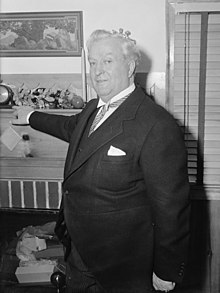Pat McCarran
Patrick Anthony "Pat" McCarran (born August 8, 1876 in Reno , Washoe County , Nevada - † September 28, 1954 in Hawthorne , Mineral County , Nevada) was an American politician . Between 1933 and 1954 he represented the state of Nevada in the US Senate .
Career
Patrick McCarran attended public schools in his home country and studied at the University of Nevada at Reno. He dropped out of his studies to work on his father's sheep ranch after he had an accident at work. After a subsequent law degree and his admission as a lawyer in 1905, he began to work in the cities of Tonopah and Goldfield in his new profession. Between 1907 and 1909 he was a district attorney in Nye County and from 1913 to 1917 he was a judge on the Supreme Court of Nevada . After that he was Chief Justice until 1918 as the presiding judge at this court and thus the highest ranking judge in his state. Between 1913 and 1918 he was also a member of the pardon committee.
Politically, Patrick McCarran was a member of the Democratic Party . In 1903 he was a member of the Nevada Assembly . In 1916 and 1926 he ran unsuccessfully for the US Senate. In the elections of 1932 he was elected as his party's candidate to the US Senate, where he succeeded Tasker Oddie on March 4, 1933 , whom he had defeated in the elections. At that time, the election outcome was fully in line with the federal trend in favor of the Democrats, who, along with Franklin D. Roosevelt, also won the presidential elections. After three re-elections, McCarran could remain in Congress until his death on September 28, 1954 . Between 1941 and 1945 he chaired the committee that dealt with the administration of the Federal District of Columbia . From 1945 to 1947 and again from 1949 to 1953 he also headed the Judicial Committee .
Political positions
McCarran campaigned for the establishment of the United States Air Force as an independent branch of service since 1933 . In foreign policy he admired the dictators Francisco Franco and Chiang Kai-shek . During his tenure in Congress, most of the federal government's New Deal laws were passed under President Roosevelt. Mc Carran was an opponent of these measures. As a strict supporter of the separation of powers , he feared that the newly created New Deal authorities would usurp too many competencies of Congress and become uncontrollable. As a staunch opponent of communism, he also feared its infiltration by members and sympathizers of the Communist Party of the USA and an influx of radical and communist emigrants. After initially opposing foreign policy treaties with the USSR, he used his position as chief of the Judiciary Committee to pass the anti-communist Internal Security Act of 1950, often named after him the McCarran Security Act , and set up an authority for registration of communist or as organizations classified as sympathetic and their members, the Subversive Activities Control Board . In 1935 the provisions of the 20th Amendment to the Constitution were applied for the first time , according to which the legislative period of the Congress ends or begins on January 3rd. He also made an outstanding contribution to American civil aviation and supported, among other things, the Federal Airport Act of 1945. This is why Las Vegas Airport , McCarran International Airport, was named after him.
Web links
- Pat McCarran in the Biographical Directory of the United States Congress (English)
Individual evidence
- ↑ Mark Patenaude: The McCarran Internal Security Act, 1950-2005: Civil Liberties Versus National Security ( Memento of the original from February 28, 2013 in the Internet Archive ) Info: The archive link was automatically inserted and has not yet been checked. Please check the original and archive link according to the instructions and then remove this notice. , Louisiana State University, Department of History, 2006, pp. 2-3
| personal data | |
|---|---|
| SURNAME | McCarran, Pat |
| ALTERNATIVE NAMES | McCarran, Patrick Anthony (full name) |
| BRIEF DESCRIPTION | American politician |
| DATE OF BIRTH | August 8, 1876 |
| PLACE OF BIRTH | Reno , Washoe County , Nevada |
| DATE OF DEATH | September 28, 1954 |
| Place of death | Hawthorne , Mineral County , Nevada |

